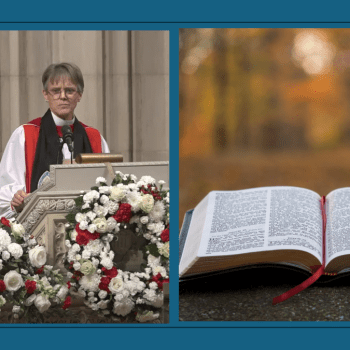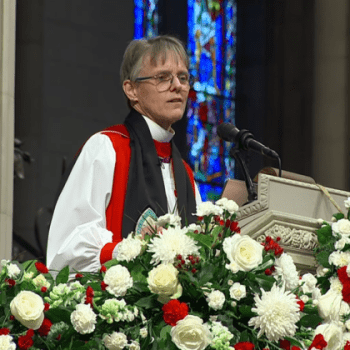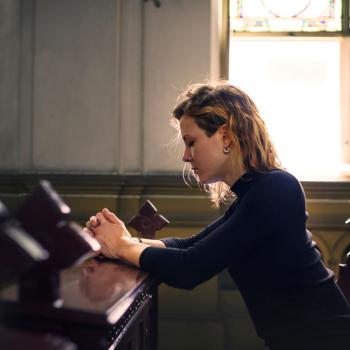Jesus’s parable about a gardener composting to save a fruitless tree can teach us about composting our anger and grief.
Read: Luke 13:1-9
Watch the video of Leah preaching this sermon about composting as a spiritual practice from her backyard garden here.
A couple weeks ago, I dug up my garden to prepare for planting.
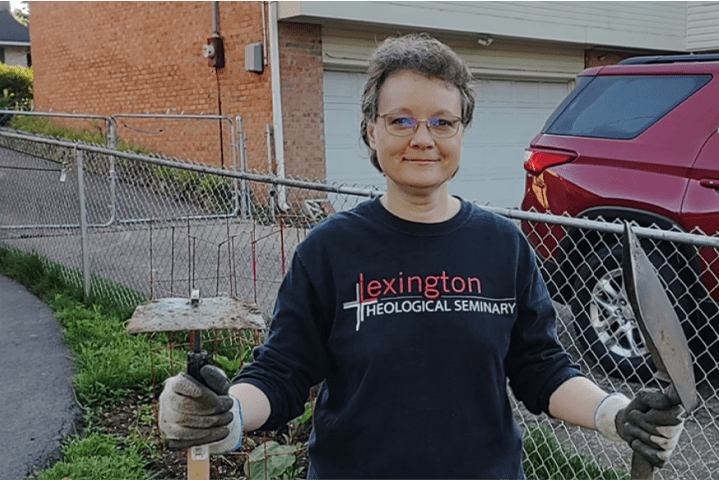
I grabbed my shovel and hoe and dug into the weeds that started to take root. Then I sorted through the compost that was in our bin. It’s a messy, gross job, but I spread it over the soil, and worked it into the garden. It’s hard work breaking up all those clumps of soil.
But I’ll let you in on a little secret.
For me, digging up the garden is therapy. Gardening is part of my anger management program.
Remember Mr. Roger’s song, “What do you do with the mad that you feel, when you feel so mad you could bite? When the whole wide world seems oh so wrong, And nothing you do seems very right?” Well, this is one of the things I do – I work it all into the dirt.
Last year, I had a lot to be angry about.
I was angry about the murders of George Floyd and Breonna Taylor and Ahmad Arbery. I was angry about what happened to those who protested the murders. The police brutality. The presidential invasion of St. John’s Episcopal Church. The growing wave of white Christian nationalism. All of that got worked into the garden last year.
And I was angry about what was happening with the pandemic. Certain leaders lying about the virus, downplaying the severity. All the conspiracy theories and disinformation. This year, when I worked the shovel and the hoe, I thought of the millions of people who got sick, the hundreds of thousands of people who died. And their families who are in mourning. It didn’t have to be this bad. Especially in communities of color that have been deliberately under-resourced in health care infrastructure for decades. All of this got worked into the garden as well.
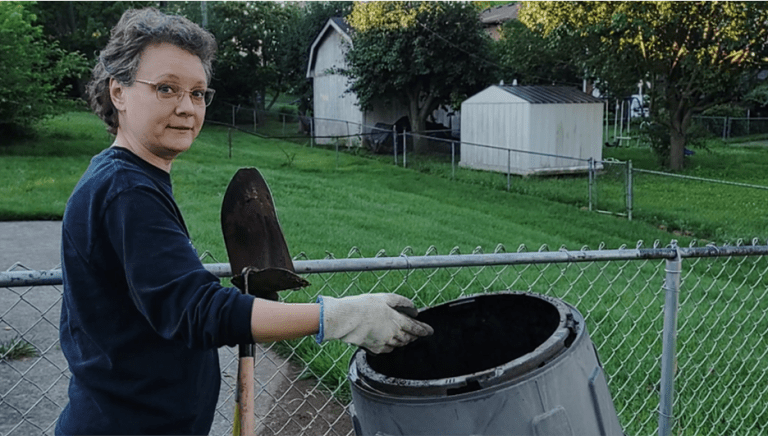
I also have to admit, my personal anger toward certain people in my life is somewhere in this garden as well.
My frustration, the mad that I feel, my grief – all of it is somewhere in this soil.
One of the things I’ve come to appreciate about Jesus’ parables is the way he uses imagery from his agrarian culture to teach spiritual truths. Like the parable about the fruitless tree in Luke 13:1-9. While talking to the crowds, he gets into a discussion with them about why bad things happen to people. Apparently, some of them think that misfortune and accidents are a result of sin – even when it’s obvious that sometimes accidents just happen. Or sometimes people die because of political violence through no fault of their own.
So Jesus tells them this parable about a king who wants to cut down a tree because it won’t bear fruit.
‘A man had a fig tree planted in his vineyard; and he came looking for fruit on it and found none. 7So he said to the gardener, “See here! For three years I have come looking for fruit on this fig tree, and still I find none. Cut it down! Why should it be wasting the soil?” 8He replied, “Sir, let it alone for one more year, until I dig round it and put manure on it. 9If it bears fruit next year, well and good; but if not, you can cut it down.” ’ (Luke 13:6-9)
The king is judge and jury over this tree and is ready to sentence it to death.
The gardener, however, pleads with him to give it another year.
He tells the king that he’ll dig around the soil and work in fertilizer. Just like I do with my garden. Just like Jesus’s listeners did with their plots of soil and vineyards.
Jesus is like that gardener, pleading with us to relent from our harsh judgments against people and writing them off as unworthy. His parable challenges me, challenges the church, to rethink our approach to the people and the problems that frustrate us.
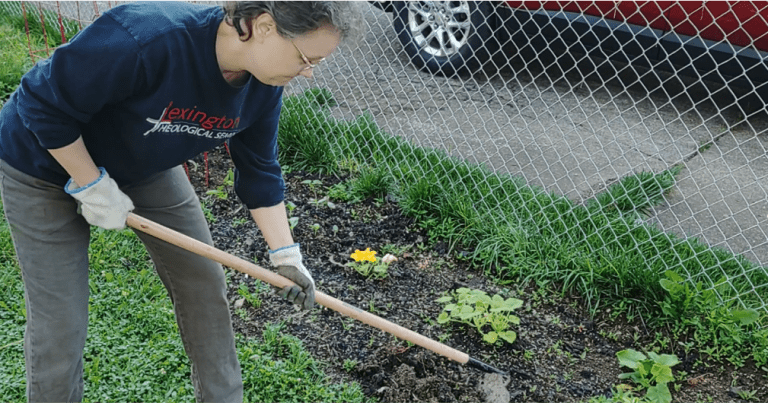
When I dug through the soil this year, it occurred to me that some of the things I was angry about last year no longer bother me. Some of the people who ticked me off have shifted in their approach to me, because, frankly, I shifted in my approach to them.
This isn’t to say that all of the grief and anger has gone away.
Far from it. All the compost I worked into the soil is still in here. But it became the fertilizer for the seeds and plants I put into the ground. This pepper plant is absorbing the nutrients from the composting I’ve worked into the soil over the past few years. It’s transforming that rotting, smelly stuff into food that will sustain me and my family.
Also, I used the anger about white Christian nationalism for the energy to create the Clergy Emergency League to help pastors in their prophetic ministry. We now have a network of more than 2,500 clergy – a fruitful harvest indeed!
That’s what the gardener hopes will happen in this parable, that we’ll see possibility instead of hopelessness.
Of course, we don’t know the end of the story. The parable leaves us with questions. Will the king listen to the wisdom of the gardener and learn patience? Will he trust the gardener? Or will he insist on his own way and order the gardener to chop down the tree?
Notice, the tree wasn’t dying. It just wasn’t getting the nutrients it needed to produce fruit. If the king has the tree chopped down, he’ll lose the chance for the fruit to appear. What a lost opportunity that would be.
Jesus is urging us to reconsider our approach, our attitude, our mindset.
The gardener is standing there with the shovel and hoe inviting us to dig, to compost, to do the hard work that can lead to transformation, to fruitfulness.
As I was composting, digging, and turning over the soil, turning over all these thoughts in my mind, I remembered a line from the hymn, “Come, Ye Disconsolate.”
“Earth has no sorrow that heaven cannot heal.”
I invite you to put your hands in some soil, to reconnect with the Earth God created. If you don’t have a garden, maybe you have a small yard where you can dig into the soil and plant some flowers or vegetables. Don’t have a small yard? Maybe you have a window where you can place a pot of soil and plant a few seeds. If you don’t have a place to plant a few seeds, maybe you can find a nearby park where you put your feet on the ground, or even sit and root yourself into the Earth. And there, you can give your anger and your grief over to the soil. Allow the Gardener to compost the mad that you feel, your frustration, your deep sadness.
“Earth has no sorrow that heaven cannot heal.”
Read also:
Gathering Up the Fragments: Sermon on Mark 13:24–37
The Heart of the Earth: Jesus, Land, and Hope
Leah D. Schade is the Assistant Professor of Preaching and Worship at Lexington Theological Seminary in Kentucky and ordained in the ELCA. Dr. Schade does not speak for LTS or the ELCA; her opinions are her own. She is the author of Preaching in the Purple Zone: Ministry in the Red-Blue Divide (Rowman & Littlefield, 2019) and Creation-Crisis Preaching: Ecology, Theology, and the Pulpit (Chalice Press, 2015). She is the co-editor of Rooted and Rising: Voices of Courage in a Time of Climate Crisis (Rowman & Littlefield, 2019). Her latest book, co-written with Jerry Sumney is Apocalypse When?: A Guide to Interpreting and Preaching Apocalyptic Texts (Wipf & Stock, 2020).
Twitter: @LeahSchade
Facebook: https://www.facebook.com/LeahDSchade/





